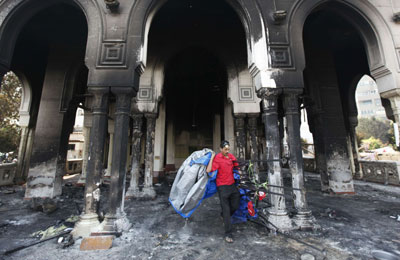
Markets are poor judge of Egyptian violence
London, August 15, 2013
By Kevin Allison
Investors responded to the violent crackdown in Egypt by bidding up the price of oil and of insuring the country's sovereign debt. The reaction is understandable, but not insightful. Political risk is just too difficult to price.
Oil is a natural focal point for investors trying to respond to the escalating crisis in the most populous country in the Middle East. While Egypt is only a bit player in the crude market, accounting for under 1 percent of global production, a more significant 4 percent of crude production passes through the Suez Canal and the parallel Sumed pipeline, according to the US Energy Information Administration.
Jaded observers might argue that the oil price rise, to a four-month high for Brent crude, is an overreaction. After all, Egypt's 2011 revolution didn't disrupt oil flows through the country. But that was a long time ago, politically.
A final failure of the democratic groundswell associated with the Arab Spring could prove a destabilising turning point for the nation, and even the region. No one really knows, and oil traders' computers don't see into the future.
The credit market response also tells little. Thursday's 30 basis-point rise in the thinly traded Egyptian credit default swaps market reflects legitimate concerns about the country's ability to pay its debts.
Spreading unrest will not be good for Egypt's already-struggling tourism industry, and the Swedish industrialist Electrolux has halted production at its Egyptian factories in response to the violence.
But the country's finances are heavily dependent on foreign aid from the Gulf states. The United Arab Emirates, which offered $3 billion of financial assistance after Muslim Brotherhood-supported President Mohamed Mursi was ousted last month, said late on Wednesday that it supported the government crackdown. Egyptian stocks are still up 60 percent from their 2011 lows.
After the military seized power last month, there was a broad feeling among investors that Egypt without a Muslim Brotherhood government might be good for the country's economy. With the death toll soaring, that judgment looks hasty.
But whatever the truth is, financial markets will only discover it in hindsight. - Reuters Breakingviews
* The author is a Reuters Breakingviews columnist. The opinions expressed are his own.







